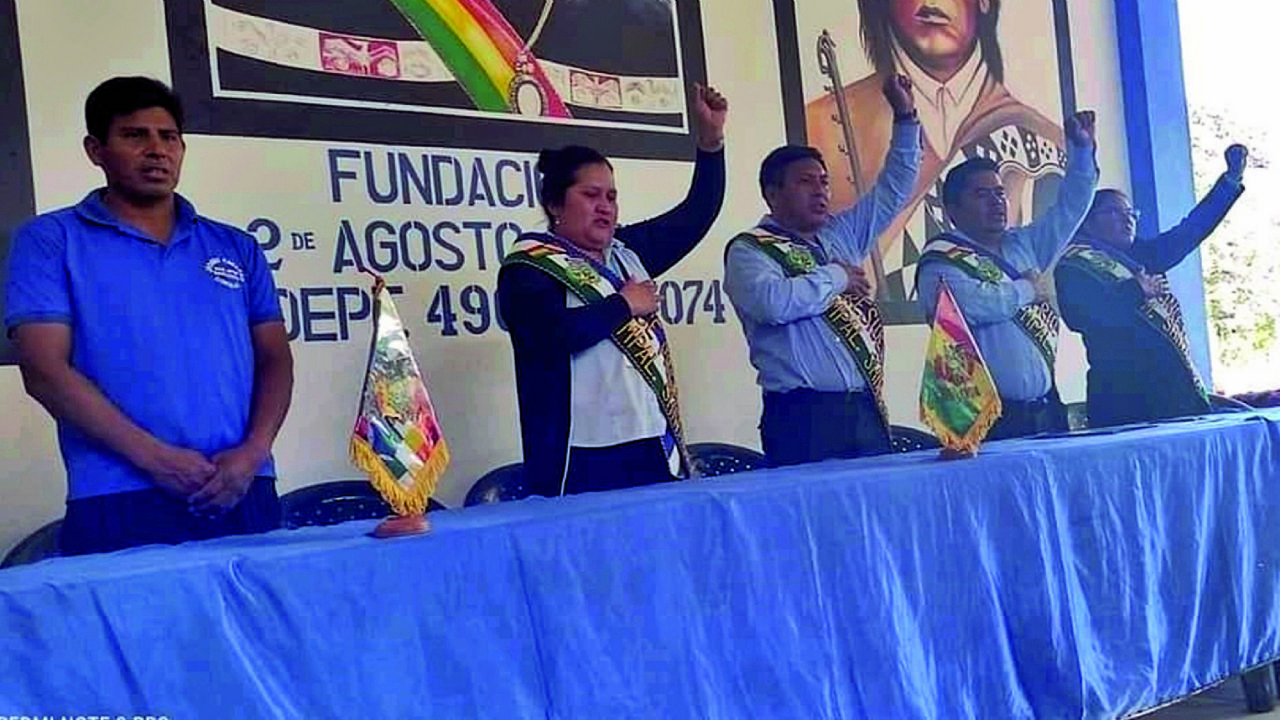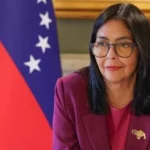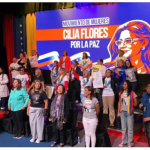Maria Mena M. / Cochabamba
“It is very difficult to be an opponent in the Chapare, there are many obstacles,” says cautiously Ariel Huaywita, the only opposition councilor for the Third System Movement (MTS) of the municipality of Entre Ríos, in the Chapare, political stronghold of the Movement Towards Socialism. (PLUS). In the five municipalities of that coca-growing area there are 32 elected councilors, of which only two are not from the ruling party.
Obstacles, marginalization and fear of reprisals have characterized the first year of management of the opposition councilors in the MAS region. Of the five municipalities of the Cochabamba tropics, in three all the members of the municipal legislative body are from the MAS (Villa Tunari with nine councilors, Shinahota with four and Puerto Villarroel with seven). Two municipalities have an opposition councilor: Huaywita in Entre Ríos and Amalia Apaza Mamani in Chimoré, both from the MTS.
Photo: Municipal Council of Chimoré
“It is normal that they exclude”
Ariel Huaywita is serving his last days as a councilman of Entre Ríos because internally they decided to apply political alternation. In his place will assume Marcial Claros Córdoba, who prepares his documents before the Departmental Electoral Court to obtain the credential that qualifies him as a titular councilor. Almost a year has passed since Huaywita took office as councilman and he confesses that “it was not easy” to be an opponent in a masista region that resists other parties and/or groups entering that coca-producing area. With some fear of reprisals, he assures that he was marginalized and removed from some activities of the Municipal Council for the fact of belonging to an opposition party.
“I have participated in what I could, but it is normal that they exclude you. That’s how they are. That happened, above all, on trips, ”she assures.
For the political analyst María Teresa Zegada, the exclusion of minorities is a daily practice. “When the majorities of the ruling party are overwhelming, obviously opposition councilors or legislators are victims of mistreatment. What governs is a policy strongly marked by overwhelming majorities”, says Zegada.
MAS deputy Héctor Arce, for his part, considers that the opposition councilors in the Chapare have complete freedom to work and exercise their oversight functions.
“There is a whole set of norms and rules that regulate the functions of the councilor. The councilor does not need anyone’s authorization to supervise, to do his job. I think they are arguments to justify the inefficiency in his work, they are invalid excuses, ”says Arce.
Evo’s control
Claros, close to assuming the council in Entre Ríos for the MTS, comments that the control exercised by Evo Morales, leader of the MAS, in the functions carried out by the council members is evident. He comments that on one occasion his partner carried out an inspection of a work that was broadcast by the local media, Morales immediately called the attention of the mayors of his party.
“There was an inspection of the Entre Ríos wastewater treatment plant, at the beginning of the administration. After inspecting, they interviewed him (Huaywita) and it turns out that comrade Evo (Morales) saw him on television and heard him on the radio. So, he gave the six MAS councilors a slap on the wrist telling them where they were. That way happens. They tend to cut off all interviews or coverage in the media when it comes to opposition councillors”, he refers.
“We are paving the way”
With that experience and others, Claros is aware that he will encounter many obstacles once he assumes the position of incumbent councilor, since the MAS has the majority of the votes in the plenary session of the Municipal Council.
“I am going to have to take over knowing that it will be a very hard job. One thinks and has different criteria, sometimes you can have good ideas and proposals in search of progress for the municipality, but as long as the majority of the Council does not approve them, there will be a dispute to be able to do something. It is going to be a very difficult job, very complicated, because we are in the tropics”, he assures.
However, knowing the obstacles that he could go through when he becomes a councilman, he assures that he has the firm conviction to make his opinions prevail, to monitor and denounce if necessary because it is due to the people who want to see his work.
Claros was a MAS supporter a few years ago and joined the ranks of the dissidents of the blue party, tired -according to his account- of the “finger” imposed by the high “political spheres”. He was a militant and active leader of the MAS for 20 years, so his decision was not easy at all.
Since he left the blues, he has been a permanent victim of harassment, threats and punishments from the Palmar 2nd Group Union and the Mamoré de Bulo Bulo Federation, from Entre Ríos, to which he still belongs.
However, he assures that he does not regret being part of the opposition and plans to continue in politics. “It is for young people that we are paving the way. We have to fight for those who are going to come, who will later join the fight for freedom of expression. I am not thinking of myself, but of those who will follow me, that is my goal. If today we have achieved one or two councillors, the next generations are going to achieve more”, she concludes.
Threats and aggressions
Since the MAS entered the Government, the opposition parties cannot freely enter the Chapare to campaign. And if they manage to get a place in the municipal councils, they are victims of harassment from the unions and coca federations.
In 2015, eight elected opposition councilors in the Chapare were stripped of their coca cats for running for a political force other than MAS. That decision was made after an expansion of the Six Federations of the Tropics that sanctioned them for considering them “divisionists.”
The elected authorities belonged to the National Unity, two were from the municipality of Shinahota and two from Entre Ríos, with their respective alternates.
The electoral campaigns for the 2020 and 2021 national and subnational elections, respectively, were marked by violence against opposition parties in the Chapare.
Community Citizen, of Carlos Mesa, and the Christian Democratic Party, of Chi Hyun Chung, campaigned in the tropics for the national elections, but their proselytizing acts were low-key for fear of attacks. The alliance Creo, of Luis Fernando Camacho, preferred to focus on non-coca growing areas.
For the 2021 subnationals, the MTS and Pan-Bol parties campaigned in the municipalities of Villa Tunari, Chimoré, Entre Ríos and Puerto Villarroel. Juana Rojas Choque ran for mayor of Puerto Villarroel, but the unions issued a resolution declaring her persona non grata, for which she was the victim of attacks and was forced to close her business due to the constant attacks she and her family received. .

Photo: Villa Tunari Mayor’s Office
The candidate for Mayor of Villa Tunari for Pan-Bol resigned before the elections due to the constant attacks she received from MAS militants. That party did not win a council in those municipalities of the Chapare. MTS presented candidates in Villa Tunari, Entre Ríos and Chimoré and obtained two councilors in the last two municipalities. Page Seven contacted the leader of the MTS, Félix Patzi, to find out his evaluation of the councilors in the municipalities where his party has representation, but he did not respond to questions.
In the cities
In the case of the metropolitan axis of Cochabamba, the MAS lost in three of seven municipalities: Cercado, Colcapirhua and Quillacollo. The Súmate political front, led by Manfred Reyes Villa, obtained seven of the 11 councilors in the capital, consolidating itself as the majority in the Council.
In Colcapirhua, Nelson Gallinate, from Comunidad Ciudadana, was elected as mayor, but the MAS obtained three councilors, Autonomies for Bolivia two, Súmate two, Civic Unit one and the MTS one.
Héctor Cartagena, from Unidad Nacional de Esperanza, won the Mayor’s Office of Quillacollo and won five councilors against five from MAS and one from Súmate.
“The opposition is marginal, it is not taken into account”
“When the majority is pro-government, those of the opposition are marginal voices and many times they are not heard or taken into account. There is an attempt to overlook the problems executives incur; therefore, the logic of democracy, of division of powers, of checks and balances -where auditing is one of the pillars- does not work”, says Zegada.
However, these minorities that were previously almost invisible today -says Zegada- have found space in social networks as a channel of expression before public opinion, although their public function continues to be silenced by the official majority.
The analyst considers that the elected authorities in rural municipalities are still victims of political harassment, threats and intimidation by the party in power, while in the cities it is uncommon for these events to be recorded.
The pro-government deputy Héctor Arce does not agree with the assertions that the elected opposition authorities are victims of harassment or persecution in his region. He says that in Omereque, the municipality to which he belongs, there is an opposition councilor and that he works in harmony with the MAS mayors.
“In my municipality there is a councilor from Súmate and they don’t have any problems, he has joined the team. He does not need authorization to inspect nor does he have obstruction problems. If someone did that, he would be committing a crime, ”says Arce.
The deputy assures that the opposition is present in municipalities with a majority of the MAS and that there is coordination and control between both forces. For example, in Aiquile there are two opposition councilors and one in Mizque, both regions of the blue party by tradition. Those mentioned do not agree with him.

Photo: Archive/ Page Seven
2 of 32
COUNCILMEN
of the five municipalities of the Chapare
they are from the MTS and are in Entre Ríos
and Chimore; the rest are from MAS.
I have participated in what I could, but it is normal that you are excluded. That’s how they are (the councilors of the MAS)
Ariel Huaywita, MTS councilor


















